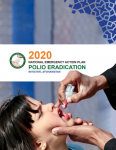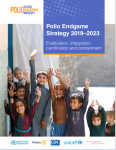Polio Eradication Strategy
The Polio Eradication Initiative in Afghanistan is determined on reaching every child with vaccines, empowering the frontline workers, strengthening surveillance and maintaining political commitment, financial resources and technical support at all levels.
The programme implements high quality vaccination campaigns that aim to reach all children under the age of years. The Polio campaigns are implemented by frontline workers who go door-to-door and health facilities to ensure every child is protected against the paralyzing disease. At the same time, the programme undertakes highly complex surveillance, detection to track the transmission of the poliovirus across the country. Communication and community engagement activities play a crucial role in encouraging and influencing behavior change amongst communities nationwide.
The programme continues to implement its strategy outlined in the National Emergency Action Plan (NEAP). The NEAP is a document developed each year to guide the implementation of the Polio Eradication Programme – and with special focus on the challenges and new framework to achieve overall interruption of transmission.
Afghanistan has maintained strong poliovirus surveillance and, in most districts, children’s immunity to the virus has significantly increased and most of the country has remained polio free. Give the complexity of the political situation in the country, the polio programme strategy is to remain neutral and at the same time gaining and maintaining access for vaccination.
The Global Polio Eradication Initiative (GPEI) launched the Polio Endgame Strategy 2019-2023, which will also guide the programme and its partners to overcome the final hurdles to eradication and move toward sustaining a polio-free future.


